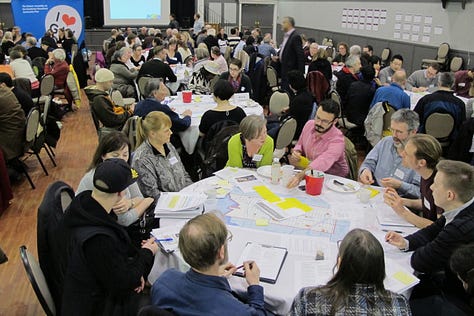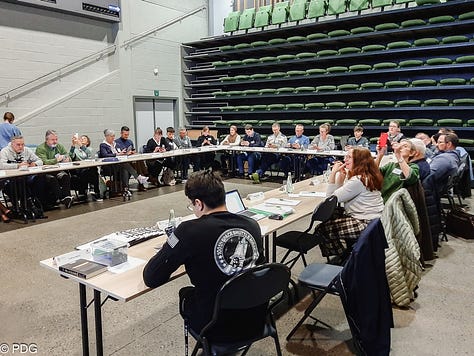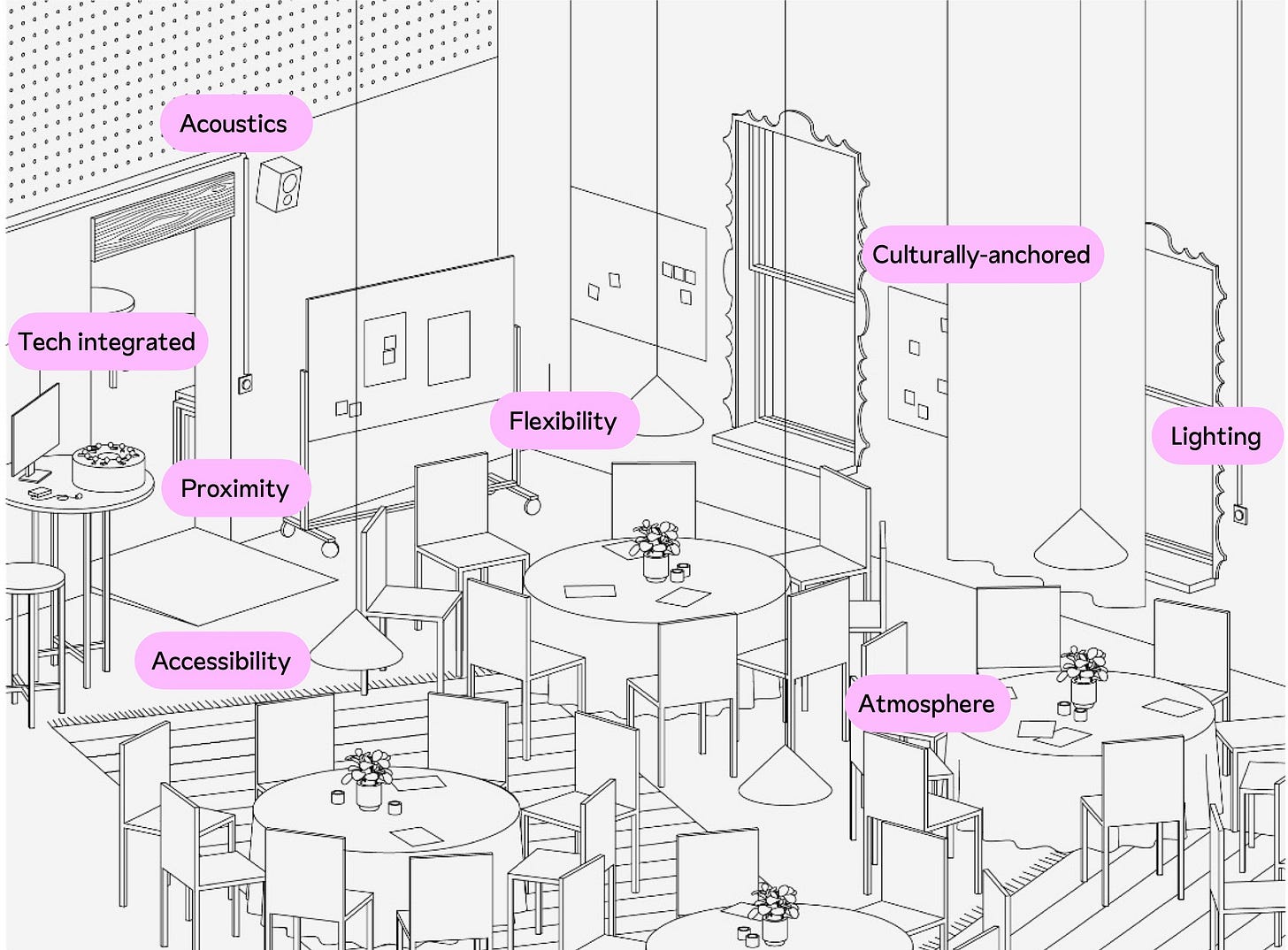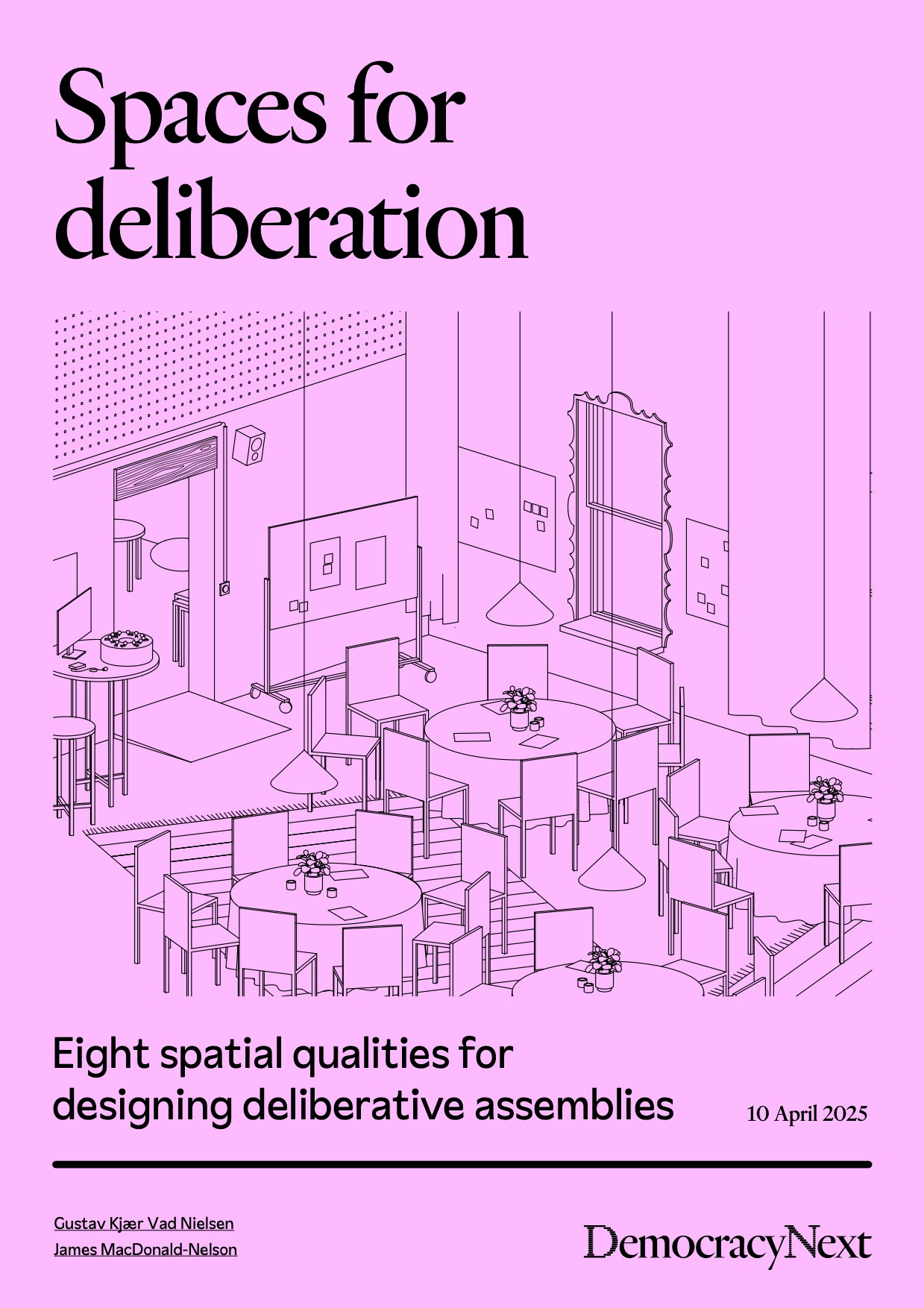New paper: Spaces for deliberation
As the “deliberative wave” continues to grow, James MacDonald-Nelson and Gustav Kjær Vad Nielsen propose eight spatial qualities for enabling deliberation



The physical spaces in which citizens’ assemblies take place can have a profound impact on an assembly’s deliberations in ways that we rarely consider.
Through interviews with leading citizens’ assembly practitioners from six countries, Cities Programme Lead, James MacDonald-Nelson and DemNext Fellow, Gustav Kjær Vad Nielsen shine a light on this critical, yet under-explored, dimension of space in citizens' assemblies in their new paper, published today.
As more and more citizens’ assemblies become institutionalised, where they take place takes on particular importance.
MacDonald-Nelson and Nielsen reveal three key findings: (1) spatial qualities are often carefully considered by conveners; (2) practical requirements typically take priority over atmosphere and symbolic value when both cannot be achieved; and (3) common challenges include high costs, inaccessibility, and limited availability of suitable spaces.
Drawing on existing literature, they examine the relationships between space and democracy, which has traditionally focused on the legislative spaces of parliament buildings within representative democracy. However, as the authors note, there has been very limited consideration of spaces specifically designed for deliberation in citizens’ assemblies. An analysis of current practice reveals an interesting tension – while there is sometimes a desire to imitate or use spaces of representative democratic institutions, there is more often an effort to intentionally break away from these traditional formats to create something new.
As a starting point, the authors identify eight critical spatial qualities for effective deliberative assemblies:
Lighting (combining natural and artificial sources);
Acoustics (incorporating specific materials and appropriate room configurations);
Connectivity (ensuring proximity between spaces);
Symbolic value (considering the socio-cultural context and identity of a space);
Flexibility (allowing for rearrangement of furniture and equipment);
Atmosphere (creating environments both formal yet welcoming);
Accessibility (ensuring physical accessibility);
Technology (making technology visible and approachable).
Understanding the spatial qualities that enable both facilitators and assembly members to engage in successful citizen deliberation can help us begin sketching principles for how we might intentionally design spaces for deliberation.
While the considerations are practically-oriented and derived from observations and interviews, they encourage further speculation on how materialities, embodied experiences, and specific spatial configurations play a role for citizen deliberation, participation, and representation in a citizens’ assembly.
🌐 Join us for the launch event today, 10 April, 9.30-10.45 ET / 14.30-15.45 BST / 15.30-16.45 CET. Macdonald-Nelson and Nielsen will be joined by three of the practitioners interviewed for the paper - Johan Galster from We Do Democracy in Denmark, Felipe Rey from iDeemos Lab in Colombia, and Sarah Yaffe from MASS LBP in Canada. The event will be chaired by Vera Sacchetti. For those who can’t attend, we’ll be recording the webinar and sharing it on our YouTube channel shortly after.
🐝 Upcoming events this spring
👉 April 14th - 16th, Birmingham, UK
Lucy Reid, COO of DemocracyNext, will be speaking at the Political Studies Association’s (PSA) Annual Conference in Birmingham. Reid will take part in a panel discussion after Professor Nicole Curato’s keynote speech on Wednesday 16 April.
Curato, who is one of our International Advisory Council Members, will lay out the possibilities for a truly global deliberative democracy confronting the ‘broligarchy’. Her research highlights the transformative power of deliberative governance in fragile and conflict-affected settings. She investigates the conditions that empower marginalised communities to assert their voices in policymaking and implementation to secure better outcomes. Her recent work explores the possibilities of building a "global deliberative democracy," drawing on decolonial theory, critical historiography, and ambitious democratic experiments such as the Global Citizens’ Assembly for People and Planet.
🖥️ April 16th, online, The Canon Institute for Global Studies (CIGS)
Claudia Chwalisz, CEO of DemocracyNext, will share her thoughts on what kind of systemic shifts are needed to democratic institutions.
In the webinar ‘Paving the Way for a Deliberative Society’, Chwalisz will explore how democratic deliberation is expanding; from citizens' assemblies to institutions like universities, museums, and workplaces, and highlight new innovations such as youth assemblies, tech-driven formats, and efforts to represent the natural world.
⏳ April 30th, University of Copenhagen
Claudia Chwalisz, CEO of DemocracyNext, will be giving a keynote at the conference organised by We Do Democracy, Københavns Universitet - University of Copenhagen, and Udviklingsselskabet By & Havn.
Chwalisz will present, ‘The voice of future generations: from megaprojects to local green transitions’, in which she asks:
How do we ensure broad and legitimate representation?
What role do future generations play in decision making?
How can democratic innovations contribute to strengthening trust?
She says, “It’s an interesting context in which to be exploring this question in Denmark, where sea level rise means a part of the country will be underwater without serious action and hard decisions needed to be taken quickly, with implications for hundreds of years.”
📡 What’s on our radar
🏭 Culture Ireland and the Arts Council have announced Assembly, a multi-sensory installation by Cotter & Naessens Architects for the Irish Pavilion at the 19th Venice Architecture Biennale, inspired by the Citizens’ Assembly.
🩺 A Swiss citizens' assembly just backed bold new health reforms to tackle soaring costs. Made up of 100 randomly selected residents, the assembly shows how everyday people can shape smart, forward-thinking policies.
🧬 What if deliberation isn’t against human nature, but part of it? A new study by Ramon van der Does argues that our capacity to deliberate evolved as a way to resolve conflict in early egalitarian societies.




